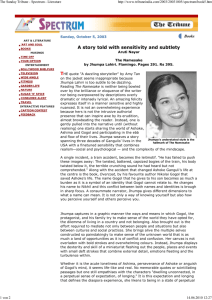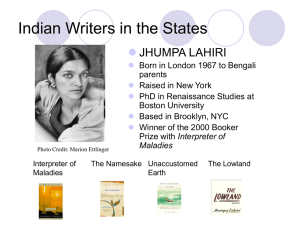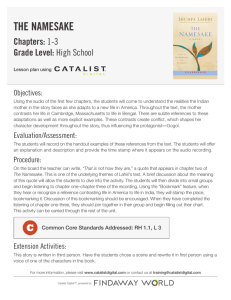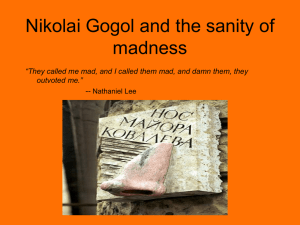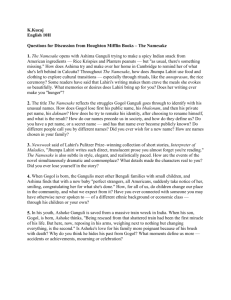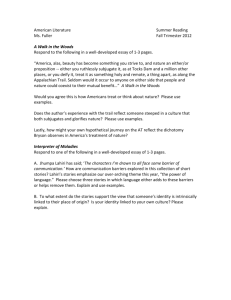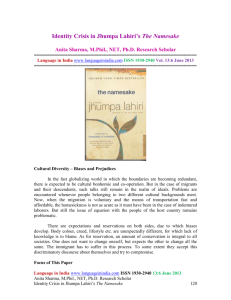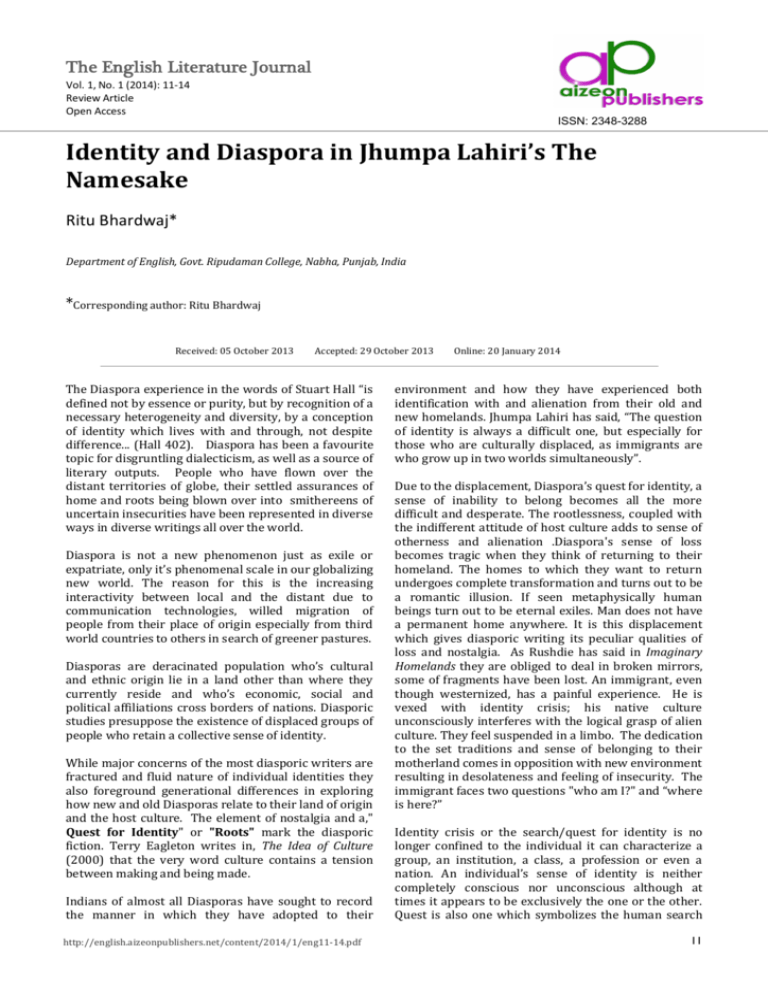
The English Literature Journal
Vol. 1, No. 1 (2014): 11-14
Review Article
Open Access
ISSN: 2348-3288
Identity and Diaspora in Jhumpa Lahiri’s The
Namesake
Ritu Bhardwaj*
Department of English, Govt. Ripudaman College, Nabha, Punjab, India
*Corresponding author: Ritu Bhardwaj
Received: 05 October 2013
Accepted: 29 October 2013
The Diaspora experience in the words of Stuart Hall “is
defined not by essence or purity, but by recognition of a
necessary heterogeneity and diversity, by a conception
of identity which lives with and through, not despite
difference... (Hall 402). Diaspora has been a favourite
topic for disgruntling dialecticism, as well as a source of
literary outputs. People who have flown over the
distant territories of globe, their settled assurances of
home and roots being blown over into smithereens of
uncertain insecurities have been represented in diverse
ways in diverse writings all over the world.
Diaspora is not a new phenomenon just as exile or
expatriate, only it’s phenomenal scale in our globalizing
new world. The reason for this is the increasing
interactivity between local and the distant due to
communication technologies, willed migration of
people from their place of origin especially from third
world countries to others in search of greener pastures.
Diasporas are deracinated population who’s cultural
and ethnic origin lie in a land other than where they
currently reside and who’s economic, social and
political affiliations cross borders of nations. Diasporic
studies presuppose the existence of displaced groups of
people who retain a collective sense of identity.
While major concerns of the most diasporic writers are
fractured and fluid nature of individual identities they
also foreground generational differences in exploring
how new and old Diasporas relate to their land of origin
and the host culture. The element of nostalgia and a,"
Quest for Identity" or "Roots" mark the diasporic
fiction. Terry Eagleton writes in, The Idea of Culture
(2000) that the very word culture contains a tension
between making and being made.
Indians of almost all Diasporas have sought to record
the manner in which they have adopted to their
http://english.aizeonpublishers.net/content/2014/1/eng11-14.pdf
Online: 20 January 2014
environment and how they have experienced both
identification with and alienation from their old and
new homelands. Jhumpa Lahiri has said, “The question
of identity is always a difficult one, but especially for
those who are culturally displaced, as immigrants are
who grow up in two worlds simultaneously”.
Due to the displacement, Diaspora’s quest for identity, a
sense of inability to belong becomes all the more
difficult and desperate. The rootlessness, coupled with
the indifferent attitude of host culture adds to sense of
otherness and alienation .Diaspora's sense of loss
becomes tragic when they think of returning to their
homeland. The homes to which they want to return
undergoes complete transformation and turns out to be
a romantic illusion. If seen metaphysically human
beings turn out to be eternal exiles. Man does not have
a permanent home anywhere. It is this displacement
which gives diasporic writing its peculiar qualities of
loss and nostalgia. As Rushdie has said in Imaginary
Homelands they are obliged to deal in broken mirrors,
some of fragments have been lost. An immigrant, even
though westernized, has a painful experience. He is
vexed with identity crisis; his native culture
unconsciously interferes with the logical grasp of alien
culture. They feel suspended in a limbo. The dedication
to the set traditions and sense of belonging to their
motherland comes in opposition with new environment
resulting in desolateness and feeling of insecurity. The
immigrant faces two questions "who am I?" and “where
is here?”
Identity crisis or the search/quest for identity is no
longer confined to the individual it can characterize a
group, an institution, a class, a profession or even a
nation. An individual’s sense of identity is neither
completely conscious nor unconscious although at
times it appears to be exclusively the one or the other.
Quest is also one which symbolizes the human search
11
Ritu Bhardwaj / The Eng Lit J. 2014, 1(1): 11-14
for attaining whatever is distant and dream like, a
search which skews from the deepest layers of one’s
soul, emotions and sub conscious desires. In a way
man’s quest is meaningful and universal.
The recurrent theme in Lahiri’s writing is the bittersweet experience of emigrant to America from India.
Her characters are often caught in a cultural limboexcited about their new home but grieving the loss of
their country of origin. In an interview Lahiri has
admitted: “I” m lucky that I’ m between two worlds… I
don’t really know what a distinct south Asian identity
means. I don’t think about that when I write, I just try
to bring a person to life”. And that is exactly what she
does though her characters.
All names have meanings and that is what makes them
meaningful and symbolic in life as well as in literature.
Names are symbols of identity. As identity becomes the
core issue, the names become quite significant. They
are conspicuous not only by their presence but their
absence as well. In literature, dealing with the clash of
cultures, countries, and races, names emerge as identity
symbols.
The novel represents the experience of a very specific
community which has no name. Sociologically, they are
second generation south Asian immigrant or south
Asian Americans. She focuses on the cultural
dislocations of one family, immigrants from Calcutta
who settle in Boston to study, work and raise a family.
The novel moves quietly, eloquently across its central
arc from the birth of a son to the death of a father. It is
also a story of guilt and liberation because it speaks
about the universal struggle to extricate ourselves from
the past, from family and obligation and the curse of
history. The great concern of novel is that Gogol the
representative of community without a name, is himself
misnamed Gogol, struggles with a name he is
embarrassed by and a heritage he is not sure of either.
Gogol wants to redefine himself on the terms that he
feels are his own rather than those that come from his
parent’s Bengali immigrant culture. In an amazing act
of self definition, he abandons the name Gogol and tries
to become someone else.
The question of identity is a very difficult one it is
related to unbelongingness and especially arises when
a person is culturally displaced and he can’t co relate
with any of the two worlds in which he is living.
Ashima Ganguly born and bred in India and married in
America undergoes same phase and she feels that living
in a foreign land is like a lifelong pregnancy. She
clutches to her moral and cultural ideology of Bengali
Indian.
Ashima and Ashoke Ganguly try to create a small
Bengal clutching to their roots and culture in America
far from the land of their birth and struggling for an
identity in the land of opportunities and riches. At
home and with friends they speak in Bengali and eat
only Bengali dishes with their hands. An atmosphere of
http://english.aizeonpublishers.net/content/2014/1/eng11-14.pdf
home is tried to be built up for children and themselves
far from their real home. This sense of alienation from
the western culture and the land where they live
creates a feeling of rootlessness among the children
who can neither co-relate with the place where they are
born and bred nor to the place to which their parents
belong to and about which they are always being told
about.
The Namesake has number of interesting parallels with
Gogol’s The Overcoat especially regarding the naming.
The story toys with anonymity with the prospect of
namelessness, it is a perfect reference for Lahiri’s story
about the strangeness of the Indian immigrant
experience in the United states and that’s somewhat
true also because the child of immigrants begins in a
kind of nowhere place. Gogol or even Lahiri is firmly of
America but is not quite an American in part because
they are not recognized as such by others. The child
may have privileges, access to education, better
opportunities but still he/she has to first discover and
then adapt to American values and life concepts which
are firmly resisted at home.
The title of the novel interrogates as does Shakespeare,
asking, “What’s in a name”? We name a child and fix his
identity, the migrants continue to observe all rites and
ceremonies their parents and their grandparents had
been observing. But even this relation with the past is
essentially imaginative, a poor substitution of the
actual. Diaspora is a site for cultural dichotomies,
parents do their utmost to create Bengali ambience for
Gogol and Sonia by arranging all Bengali get-togethers,
but the two as they grew in hybrid culture, part Bengali,
part American, gingerly respond to their parents efforts
to create a homeland in America, an oasis of Bengali
culture.
Ashima tells Gogol about Durga Puja, she also makes
him memorise four line children’s poem by Tagore. But
at the same time she is conscious of her child being
American student and makes him watch Sesame Street
and the Electric Company in order to match with
English he uses at school. So Gogol is always sailing in
two boats simultaneously,one with his parents at home
speaking Bengali and living in Bengali style and the
other of American Indian. But being too small to
understand the impact of these things he is least
bothered about his hyphenated existence as long as he
has not stepped into the outer world which is alien to
his parents but not for him as he is born American
Indian.
His identity as Gogol, namesake of Nikolai Gogol,
Russian author, looms over longer period of his life,
creating a divide self which can’t reconcile with his past
present or future, always drifting like a rudderless boat
from one shore to another without ever realizing its
true self. The main problem with Gogol is that he is a
hyphenated character living in two totally different
worlds, the stress of which he can’t cope up, he is lost
and drifts away from his parents and culture. He wants
12
Ritu Bhardwaj / The Eng Lit J. 2014, 1(1): 11-14
to be an American living in Americ, rather than as
Indian living in America. He belongs to second
generation of Diaspora which is born and bred in
America and whose values have been defined by
American culture for whom India is an alien country to
be visited once a year to spend holidays and meet
relatives with whom you don’t have any have any close
contact except for two or three month they spend in
India in the houses of different relatives who are
always fawning upon these NRIs.
Lahiri’s thinking is existential. The man is thrown into
the world abandoned to chance factor, which has
already constituted him. He discovers himself as
already brought into being, a fact among other facts.
This is man’s factuality and it becomes his destiny.
Haunted by the fear of death, his father decided to
move to America, as if the new country were immune
from death. Lahiri also suggests that though one is
determined by chance factors but one also determines
oneself. Man is both that is which he has been but and
also which he can become. Man is born without his
choosing it in a certain family, community, but he is free
and responsible to transform the world and redefine as
Gogol does in the novel by refusing to be Gogol
anymore.
Gogol changes his name. All appears to be easy with
the change of name but still something is there that irks
him that deflates his ego, divides his identity. He is
happy with his new name,Nikhil, but still feels like
being separated or severed from his past which was
attached with Gogol. His past continuously haunts and
to get rid of this past he severs his connection with
past. “There is only one complication. He doesn’t feel
like Nikhil not yet. Part of the problem is that the
people who now know him as Nikhil have no idea that
he used to be Gogol. They know him only in the
present, not at all in the past.” (Lahiri 105).
So far Gogol has never ever known about the word
ABCD that is American Born confused Deshi. One day
he has to attend a panel discussion about Indian novels
written in English, as one of the presenters on panel
was Amit his distant cousin because his mother has
asked him to do so. One sociologist on panel explains
that:
“Teleologically speaking ABCD’s are unable to answer
the question, “where are you from?” Here he realizes
that it he who is being discussed because he born in
America never thinks of India as a desh. He thinks of it
as Americans do, as India.” (Lahiri 118)
He realizes that although he understands his mother
tongue and can speak fluently but can’t read it or write
it. Even his Americanised accent in India was a source
of amusement to his relatives who never understood a
single word. He has never ever noticed ABCD’s on his
campus, nor he ever wanted to remain in contact with
them as they reminded him too much of the way his
parents choose to live. Befriend people not so much
http://english.aizeonpublishers.net/content/2014/1/eng11-14.pdf
because they like them, but because of a past they
happen to share.
He wants to carve a separate identity of his, different
from that of his parents to understand the reality of life
where no one just know him as Nikhil Ganguly son of
Ashoke Ganguly but as American Nikhil, an architect.
His search for identity lies at roots of his wanderings,
he moves from one place to other, away from his
parents home Pemberton road. Just like his father he is
searching roots far away from the roots He is having
wings but his feet are ingrained in his past, which he
can’t understand.
The book advances through the women who serve as
signposts along the road of Gogol’s search for identity.
Maxine Ratliff, an old money New Yorker, when he falls
for her, its more than her blond hair and green eyes it’s
the family’s easy way of inhabiting the world. So
different from the awkwardness of his parents.
In the death of his father, he finds a beginning,
awareness and understanding of the place of individual
within the family. The ambivalence of his in-between
state ceases to trouble him anymore. From here he
starts on the journey to the end of his quest of identity
as who he is, where he belongs to. He identifies himself
with his culture and roots. He is now Bengali Indian in
America, assimilation of two cultures.
CONCLUSION
From where do we take our notions of romantic love,
from our family and friends, or from the society and the
media? How much does our cultural heritage define our
ideas and experience of love? Lahiri has explored in
several ways the difficulty of reconciling cross- cultural
rituals around death, dying and love. She has tried to
answer all these questions in her own poise through
the quest of identity of her characters. Who are what
they are actually, Indians at heart, having familial ties,
bonds that last long than all the physical relations they
build around themselves. The second generation
Diaspora finds their roots only after undergoing
cultural imbalance. Multiculturalism teaches them that
where the person may go or wander, he will always go
back to roots in search of his identity. His expatriate
sensibility will never remain in rest until and unless his
quest ends. The authenticity of one’s self, its discovery
is full of trials and errors but this search is meaningful
as it will ultimately lead person to find a meaning in
this otherwise meaningless world. “Nothing begets
anything”, but something does provide a self.
Gogol realizes now that he has spent years maintaining
distance from his origins and his parents bridging that
distance. How could, he wondered, his parents did it
when they decided to come to America, leaving behind
their family and friends. The novel comes full circle
with Gogol’s reflection on human alienation. It started
with a push towards anonymity, Gogol’s, in the very
name he was given sadness and amusement. He had
13
Ritu Bhardwaj / The Eng Lit J. 2014, 1(1): 11-14
tried to correct this error and yet it had not been fully
possible to reinvent him fully.
Man is made of events from his birth till death, one
can’t forego one’s past and roots, these will remain
forever looming here and there shaping one’s present
and future. Gogol is thus shaped by the contingency of
life, including his naming. These happenings formed his
identity. He could not have shaped them, for the world
is contingent as there is no reason for its being and
central fact about human existence is its temporality.
The book gives a dimension into the life of next
generation Indian kids growing up in western culture.
Lahiri brings great empathy to Gogol as he stumbles
along path, strewn with conflicting loyalties and heart
wrenching love affairs that lead him back to the old
ways of his parents.
Lahiri with penetrating insight reveals not only the
defining power of names and expectations bestowed
upon us by our parents, but also the means by which
we slowly sometimes painfully, come to define
ourselves.
naming him as someone else, he heard the call of
conscience. Human existence, as Gogol also comes to
posit in the end, is being in the world his parents were
born in a society, in a family and a state. Their very
structure was constituted by their relation with others
and the world. There is no escape from involvement
but it should be authentic involvement. Gogol stands
out as unlikely man in the chaos that surrounds him,
and his uniqueness strikes us to the point of oddity. He
is the product of expatriate sensibility emerging out of
the clash of continents and cultures, a child of abrupt
historical journey patterns, a representative of
generation with torn hopes and psyche. He can say, he
is an allegorical man whose life encapsulates a whole
collective historical experience. The quest for identity
in his case can be said as a rootless search for life boats
of endurance and survival. Philosophically it is a deep
exploration to reach a stage of conviction about value of
life which pitted against the forces of history and
events.
REFERENCES
The first generation’s story was about adaptation and
learning, acculturating, and also discovering new things
about themselves. The second generation found itself
presented with two conflicting realities and cultures
and sets of expectation. The struggle exists at a
formative level and there’s a sense of helplessness and
even desperation.
Except Gogol no one in the family is aroused out of this
in authenticity. He alone in the end chooses to rise out
of his average existence. He resolved to leave a name
behind, which an average person would hardly think of.
Thus he hoped to become a category which is desirable
because to become entails the realization that we must
die, a realization which is of crucial importance.
Gogol in his reflection achieves what Nikolai Gogol was
he becomes a commentator. He assumes his parents;
consciousness Diasporic in essence, that one should
retrace one’s origins because one belongs there. He
himself had spent years maintaining distance from his
origins and yet for all his aloofness, his impersonality of
1.
2.
3.
4.
5.
6.
7.
8.
9.
Bala, Suman, ed. Jhumpa Lahiri: The Master Story teller A
Critical Response to Intereter of Maladies. New Delhi: KPH.,
2002
Bhabha Homi K. The Locaiton of Culture. London: Routledge,
1994.
Eagleton, Terry. The Idea of Culture. Oxford: Blackwell, 2000.
Hall, Stuart. Cultural Identity and Diaspora’ in Colonial
Discourse and Post Colonial Theory. ed.Patrick Williams and
Laura Chrisman, London: Longman, 1993.
Jain, Jasber. Critical Spectrum: Essays in Literary culture.
Jaipur: Rawat publications, 2003.
Jha, Paramanand. Home and Abroad: Jhumpa Lahiri's
Interpreter of Maladies. The Indian Journal of English Studies,
Vol. XXXVIII (2000-2001).
Kaur, Tejinder, and N.K. Neb, eds. Perspectives on Diaspora
Indian Fiction in English. Jalandhar. Nirman Publications,
2005.
Lahiri, Jhumpa. The Namesake. New Delhi: Harper Collins,
2003.
Sharma, Kavita A ,Adeshpal. Theorising and Critiquing Indian
Diaspora, Creative New Literature Series-64. New Delhi:
Creative Books, 2000.
© 2014; AIZEON Publishers; All Rights Reserved
This is an Open Access article distributed under the terms of
the Creative Commons Attribution License which permits
unrestricted use, distribution, and reproduction in any medium,
provided the original work is properly cited.
*****
http://english.aizeonpublishers.net/content/2014/1/eng11-14.pdf
14


